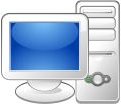Anti Virus Software Slows My Computer - Causes and Fixes
Perhaps it’s ironic that a piece of software that is designed to protect computers can actually cause them to work less efficiently. Some regard this performance penalty as the price that has to be paid for security. For others, it is an annoyance they will never tolerate. Unfortunately, there are those that won’t utilize anti virus software unless software companies find a way to resolve the issues that cause computers to run slowly. These people constantly search for a resolution to the question “why does anti virus software slow my computer?”
Why Anti Virus Software Slows Down Processes
It does make sense that a computer should become slower after anti virus software is installed, bearing in mind that the computer is gaining more work to do. A typical anti virus program scans and monitors every file that the operating system creates, opens, closes or emails. The traditional way of doing this is to compare these files against a dictionary or database to see if the file has any code that matches a virus signature. This process takes up CPU processing time, computer memory, and also time to access the hard drive and other storage media.
Fixing the Anti Virus Software Slowdown Issue

It is really tempting to just remove all anti virus software from a machine if it is obvious that it is the causing the machine to run slowly. But with the increasing and real threat that viruses pose, leaving computers without proper virus protection is not an acceptable option. However, there are steps that can be taken to speed up a computer if you wonder why anti virus software slows my computer.
Setting Full Scans to Run at PC Idle Times
Undoubtedly, it’s a good idea to set anti virus programs to periodically do full system scans. While the scan is being done, it can really slow down the computer because full scans need to access a large number of files. Computer users can get around this problem by scheduling the computer to scan when it is idle, such as when the user is at lunch or during night hours. Scheduling full virus scans is a feature that most anti virus programs have. To find your scan scheduling feature, search around in the menu or check the help tab for instructions on scheduling a full system scan.
Do Simple Maintenance
Another way to speed up a computer is to do simple computer maintenance. If a computer is in need of maintenance, the need can be more pronounced when anti virus software is running. Ensure that the computer hard disk is defragmented on a regular basis, update software, and delete unwanted and unnecessary files. Ask an IT professional to help with more advanced options such as cleaning the system registry.
Upgrade the Computer
If buying a new computer doesn’t make economic sense, consider a simple upgrade as an option to make the slow computer run faster. Consider increasing the amount of memory as your first option. Other options include increasing the hard drive capacity or upgrading the processor.
Buy a New Computer
If rescheduling virus scans and cleaning up the computer doesn’t stop your computer from running slow, a last resort may be to buy a new computer, especially if upgrading the old machine is not a feasible or sensible option. Buying a new computer is the most expensive option, but if the other options have not worked, or the computer is too slow to use, it may be the only option.
Summary
To ensure that computers are always protected, anti virus software must constantly run behind the scenes to check every file and activity for potential threats. While an anti virus program may cause a computer to become slow, turning off the anti virus program is not an option if computer security is of utmost importance.
Instead, computer users may consider scheduling full virus scans (when the machine is idle), doing proper systems maintenance, and upgrading their computers as part of the effort to improve the computer’s speed. If all of the above measures don’t work, computer owners can consider buying a new computer as a last resort to increase the computer’s speed. Hopefully, you can now say “I know what to do if an anti virus software slows my computer,” and use the necessary tools or ideas to correct the problem.
Image Credits:
- Meddygarnett. https://www.flickr.com/photos/meddygarnet/3459415984/
- Computer & Screen / Wikimedia Commons
